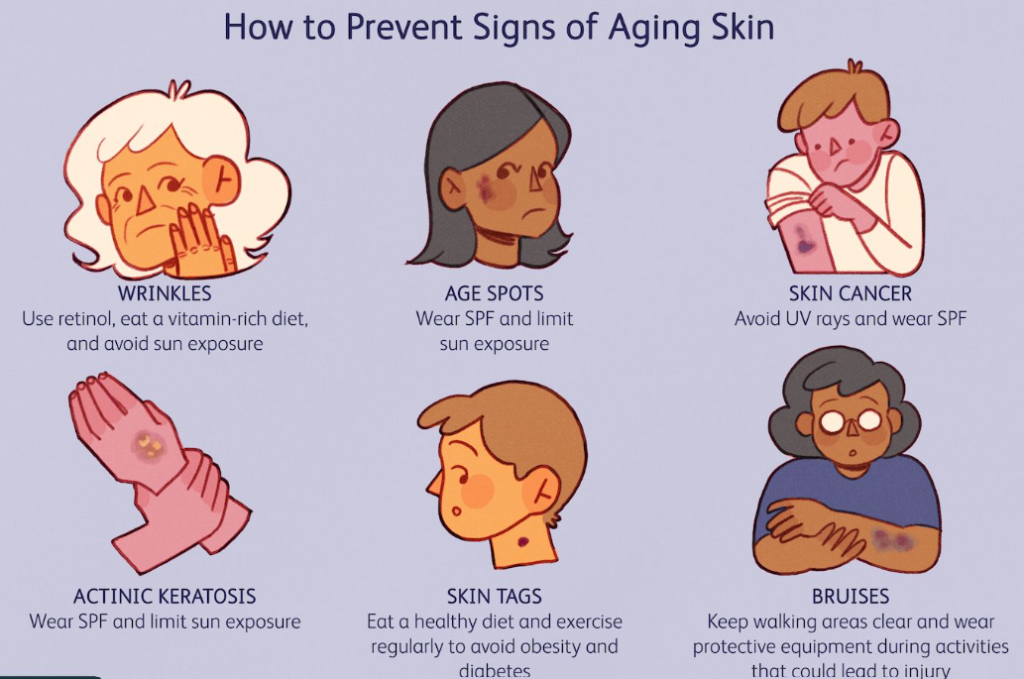
Skin aging is a natural process, but external and lifestyle factors can accelerate it. While you can’t stop aging entirely, you can slow its progression and reduce its visible signs. Here’s how you can prevent or slow skin aging:
Protect your skin from the sun

The sun’s ultraviolet (UV) rays are the leading cause of premature skin aging. To protect your skin from the sun, wear a broad-spectrum sunscreen with an SPF of 30 or higher every day, even on cloudy days. Reapply sunscreen every two hours, or more often if you are sweating or swimming.
person applying sunscreen on their faceOpens in a new window
Protect from Sun Exposure:
Sunscreen: Use broad-spectrum sunscreen with SPF 30 or higher. Apply every day, even if it’s cloudy or if you’re indoors most of the day (UVA rays can penetrate windows).
Clothing: Wear protective clothing, like wide-brimmed hats and long sleeves, when outdoors.
Shade: Seek shade, especially between 10 a.m. and 2 p.m., when the sun’s rays are strongest.
Eat a healthy diet
Eating a healthy diet can help to keep your skin looking young and healthy. Make sure to eat plenty of fruits, vegetables, and whole grains. These foods are packed with antioxidants, which can help to protect your skin from damage. Eating a diet rich in fruits, vegetables, whole grains, and lean proteins can promote healthy skin. Antioxidant-rich foods combat free radicals that can age the skin.
Get enough sleep
When you don’t get enough sleep, your body produces more of the stress hormone cortisol. Cortisol can break down collagen, which is a protein that helps to keep your skin firm and elastic. Aim for 7-8 hours of sleep per night.
Manage stress
Stress can also contribute to premature aging. Find healthy ways to manage stress, such as exercise, yoga, or meditation. Chronic stress can make the skin more sensitive and accelerate aging. Find ways to manage stress, like meditation, yoga, or deep-breathing exercises.
Avoid smoking and excessive alcohol consumption
Smoking and excessive alcohol consumption can damage your skin and lead to premature aging. Smoking accelerates skin aging, leading to wrinkles, a dull complexion, and a leathery texture. Alcohol is dehydrating and can damage the skin over time. It’s best to drink in moderation.
Use anti-aging skincare products
There are a number of anti-aging skincare products available that can help to reduce the appearance of wrinkles, fine lines, and age spots. Some popular anti-aging skincare ingredients include
Exercise Regularly:
Physical activity increases blood flow, helping nourish skin cells and keeping them vital. It also helps flush cellular debris out of the system.
Cleanse Gently:
Scrubbing your skin clean can irritate it, accelerating skin aging. Wash with a gentle cleanser instead.
Moisturize:
Moisturized skin looks more youthful and healthy. Opt for a moisturizer that suits your skin type.
Avoid Repeated Facial Expressions:
Repeatedly making the same facial expressions can lead to fine lines and wrinkles. Wearing sunglasses can help reduce lines caused by squinting.
Stay Hydrated:
Drinking plenty of water helps keep your skin hydrated and can improve its appearance.
Get Enough Sleep:
Aim for 7-9 hours per night. Sleep allows the skin to repair and regenerate.
Manage Stress:

Chronic stress can make the skin more sensitive and accelerate aging. Find ways to manage stress, like meditation, yoga, or deep-breathing exercises.
Use Skincare Products with Proven Ingredients:
Products containing retinoids, peptides, hyaluronic acid, certain antioxidants (like vitamin C), and alpha hydroxy acids can help reduce signs of aging.
Regular Skincare Routine:
Consistency is key. Establish a daily routine that includes cleansing, moisturizing, and sun protection.
Limit Exposure to Pollution and Environmental Toxins:
These can generate free radicals that damage skin and accelerate aging.
Avoid Tanning Beds:
UV light from tanning beds can cause premature skin aging and increase the risk of skin cancer.
